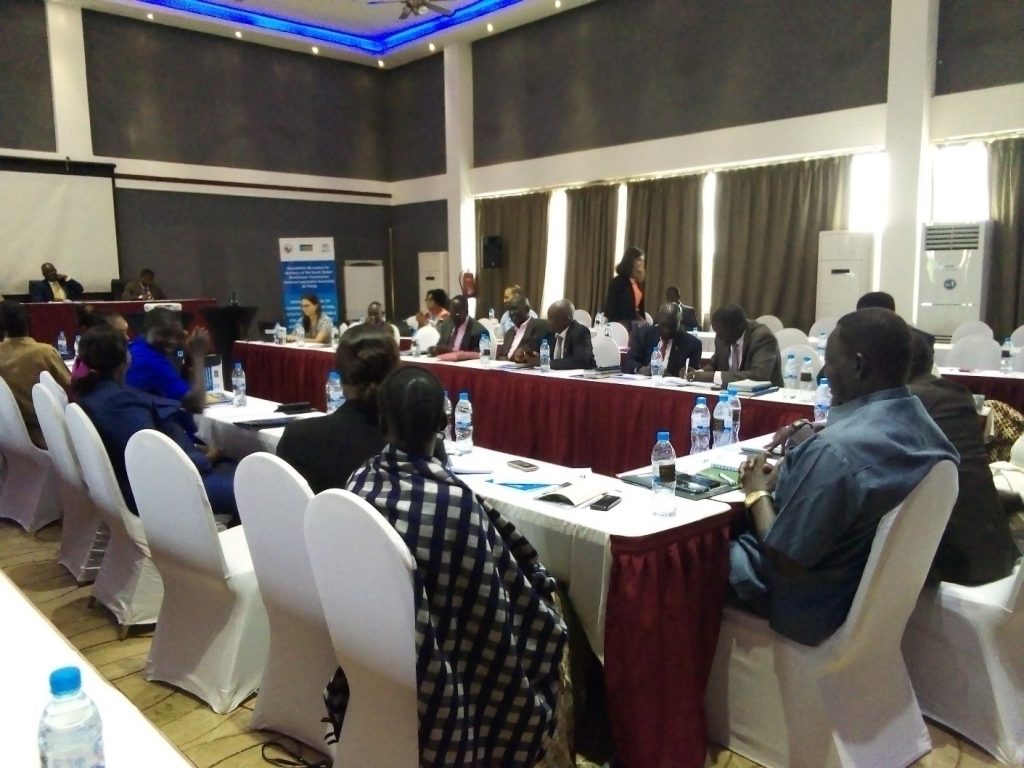
By Philip Buda Ladu
The United Nations High Commissioner for Refugees (UNHCR) in partnership with the Ministry of Humanitarian Affairs and Disaster Management has empowered lawmakers at the Revitalized Transitional National Legislative Assembly (R-TNLA) on championing the rights of displaced persons and Stateless populations.
UNHCR and the Ministry of Humanitarian Affairs and Disaster Management engaged the legislators at the R-TNLA in a two days’ roundtable discussion that concluded on Thursday 21st April 2021 on the Domestication of Kampala Convention, South Sudan Durable Solutions Strategy and Conservations on Statelessness.
The objective of the roundtable was to engage with parliamentarians on South Sudan’s Solutions Strategy for displaced persons, understand the importance and relevance of the risk of Statelessness in South Sudan to explore how MPs can enhance the protection of refugees, IDPs and persons at risk of Statelessness.
The event was part of UNHCR’s advocacy efforts for the accession of both Statelessness Conventions by South Sudan.
Parliamentarians were capacitated to champion the advancement of the rights of the displaced and Stateless populations in parliament and beyond, further supporting the development of policies and assent to law of proposed Bills.
At present, IDPs currently numbers 1.6 million, while spontaneous refugees’ returnees stand at 507,000 individuals; South Sudanese refugees’ figures stand at 2.2 million hosted in Uganda, DRC, Ethiopia, Kenya and Sudan according to UNHCR and there is an unknown number of people at risk of Statelessness.
South Sudan on the other hand hosts 335,000 refugees located in over 21 different locations across the country said the UNHCR.
In response to the challenge of preventing and addressing internal displacement on the African Continent, in 2009 African States joined forces through the African Union (AU) to create the African Union Convention for the Protection and Assistance of Internally Displaced Persons in Africa referred to as “Kampala Convention”.
The innovative treaty became the world’s first ever legally binding instrument on IDPs protection, entered into force in 2012 after 15 African States ratified it. On 14th June 2014 South Sudan acceded to the Kampala Convention but it is yet to ratify the treaty.
Lawmakers play a crucial role in addressing forced displacement challenges and finding solutions in South Sudan.
Dr. James Mabor Gatkuoth the Chairperson of the Committee of Legislation and Justice at the R-TNLA said they were invited as two committees of R-TNLA the committee of Humanitarian Affairs and Human Rights and that of Legislation and Justice were asked to discussed sort of domesticating the Kampala Convention which only need small process of ratification and also the IDPs’ bill which has to be enacted as a law.
“IDPs bill is important at this stage because as we are in the stage of peace process it means the come back home is very near so we must see that it is enacted as a law and they get the services out of it, it’s budgeted for, so we came to reflect on that which we have done,” Dr. Mabor said.
He said they have proposed some ways forward and steps adding that they hope the bill will be enacted into law once it reaches parliament.
Dr. Mabor urged the IDPs in the country and the South Sudanese refugees in the neighboring countries to follow the peace implementation with enthusiasm because the prevalence of peace means there is going to be rule of law exiting and they come back with the care of the government.
Hon. John Dabi, the Deputy Commissioner of South Sudan Commission for Refugee Affairs who was one of the panelists at the roundtable discussion said currently the plans are being developed which will be passed to the Cabinet through the Ministry of Humanitarian Affairs and once that’s done its passed to become a document then they will engage all the different ministries to implement it.
“This workshop is very good because then, it will give the parliamentarian to address through the legal frameworks that has been developed and passed and then people can use that as the guidance to address the issues because without those guidelines you have nothing to use as a framework for supporting the IDPs,” Dabi underscored.


